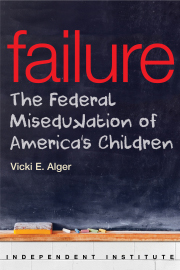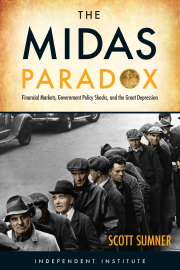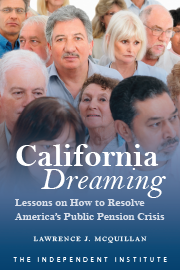K. Lloyd Billingsley • Thursday, September 6, 2018 •
California has become the first state to eliminate cash bail for those charged with crimes. Currently judges establish bail amounts and bail bondsmen guarantee their appearance in court. As Topo Padilla of the Golden State Bail Association told the Sacramento Bee, “Bail bondsmen are insurance agents. We issue an insurance policy to the court guaranteeing a person’s appearance in court. If a person fails to appear in court, the bail industry goes out and returns people to the court. If we fail to return the person to court in time, we pay the full amount of the bond.” Critics charged that this system favored the wealthy and as Jerry Brown explained it, “Today, California reforms its bail system so that rich and poor alike are treated fairly.” Bail bondsmen might not think it fair that their entire industry has been eliminated, and taxpayers have room for reasonable doubt.
Instead of conventional bail, the California Judicial Council, a government body, will develop “assessment protocols” for defendants. As longtime Sacramento observer Dan Walters notes, the new law will “create thousands of new civil service jobs in the court system for evaluating defendants.” True to form, last year governor Brown signed a bill authorizing the Service Employees International Union, the largest government union, to represent employees at the California Judicial Council. As we noted, the SEIU parades outside the capitol chanting “This is our house!” So taxpayers can be forgiven for seeing the bail “reform” as another payoff to government employee unions. On the other hand, it could be another case of special treatment for criminals.
Proposition 47 transformed felonies into misdemeanors and treats the theft of nearly $1,000 in property like a traffic ticket. This made cities like San Francisco a one-stop robbery center, with some 30,000 car break-ins last year alone. Proposition 57 is giving a second chance to convicted murderers such as Daniel Marsh, the sub-nihilist sadist who murdered and mutilated Oliver Northup, 87, and his wife Claudia Maupin 76, in their Davis home. As the victims’ loved ones might say, no justice no peace.
***
K. Lloyd Billingsley is a Policy Fellow at the Independent Institute and a columnist at The Daily Caller.
Craig Eyermann • Thursday, September 6, 2018 •
Illinois is rapidly advancing into one of the worst state government pension liability crises in American history.
Last week, debt rating service Moody’s announced that Illinois had achieved the most underfunded pension system for state government employees in U.S. history, where the state “saw its adjusted net pension liabilities reach $250 billion, or 601% of state revenues (in 2017, before the state’s 2018 tax increase), an all-time high for any state.”
According to Moody’s, the median net pension liabilities for states nationally is 107 percent of their tax revenues.
Those liabilities are costly in that Illinois’ credit rating has fallen to be just one step above junk status. The lower a borrower’s credit rating, the higher the interest rates they must pay when borrowing money.
Even more remarkable is that Illinois’ public employee pension managers lost money in 2017, defying the odds of making money through investments during a year that saw one of the biggest and longest sustained rallies in U.S. stock market history.
To say that Illinois’ pension plans for state and local government employees are in a state of disaster is something of an understatement. Because Illinois’ state constitution guarantees that state and local government employee pensions will not ever be diminished below the levels that politicians have promised, regardless of how inadequately those same politicians have funded those lavish pension plans, or how badly their investments perform, or how mismanaged the pension funds have been, several local governments in the state are now having to reduce needed services to the public to pay for the very generous pensions of retired government employees.
Randall Holcombe • Wednesday, September 5, 2018 •
As a college teacher, I try to listen to all points of view, and I want students to feel they can speak up in class to express their own thoughts, and to challenge anything I say in class. I tell them, “Don’t believe anything I tell you. This is college and you should be thinking for yourselves. If what I say doesn’t seem right to you, speak up and I will strive to give you a respectful hearing.”
Last week, early in the semester, a student abruptly left my classroom. I didn’t think too much about it. (This happens more often than you would think. Often, students will go to the restroom and come back in a few minutes later.) Later, a colleague in the hall who saw the student leaving told me the student was swearing, was visibly agitated, grousing about the politically liberal views of college professors. While evidence supports this, this is the first time to my knowledge that someone has included me in that group.
Craig Eyermann • Wednesday, September 5, 2018 •
Historian Victor Davis Hanson coined a great nickname for California’s Bullet Train construction project, calling it “California’s Stonehenge.” The project is proving to be a very costly monument to the ego of state politicians.
How costly? California’s high-speed rail project is back in the news thanks to the Los Angeles Times‘ Ralph Vartabedian’s reporting on the ever-escalating cost of the troubled project, where the construction bills are now topping $3.1 million per day:
The California bullet train project has cost state taxpayers an average $3.1 million a day over the last year—a construction spending rate higher than that for the Bay Bridge, Boston’s Big Dig or any U.S. transportation project in recent history.
But still it’s not enough, planners say.
K. Lloyd Billingsley • Tuesday, September 4, 2018 •
By government standards $62,500 is not a lot of money, but there’s more to learn for taxpayers, parents and students in this San Diego Union-Tribune story. A lawsuit by the California Taxpayers Action Network charged that San Diego County superintendent Randy Ward, with collaboration from chief financial officer Lora Duzyk, gave himself unauthorized raises totaling $70,000 to $100,000 over eight years. The means, the network charged, was the “me too” clause giving administrators a raise whenever teachers got one. The county board launched an audit, at a cost of $70,000, which it failed to complete. The board released no report and would not comment on the Union-Tribune story.
Ward said he did nothing wrong, but the San Diego County Office of Education settled with the Taxpayers Action Network for $62,500. By law, the county office is required to represent Ward and Duzyk. So taxpayers are on the hook, not the bureaucrats their own selves. That also applies in settlements for sexual harassment and such.
Raymond March • Sunday, September 2, 2018 •
I recently published an op-ed at The Hill entitled “Breastfeeding Controversy Shows Need for Private Efforts—Not Government Campaigns.”The piece came after U.S. ambassadors faced considerable criticism for attempting to block a World Health Assembly resolution calling for governments to devote more resources to promoting breastfeeding and to place more stringent advertising regulations on breastfeeding substitutes in developing nations.
Instead of criticizing politicians, I tried to address what I consider a more pressing question: Do we really want governments more involved in promoting global health efforts? My answer was no. To justify my stance, I provided peer-reviewed research indicating that government efforts to promote public health and improve living standards in developing countries have repeatedly failed. As an alternative, I provided evidence that private efforts to promote childhood nutrition (specifically breastfeeding) were more up to the task.
Raymond March • Saturday, September 1, 2018 •
Last March, the U. S. Food and Drug Administration announced its intention to lower nicotine levels in cigarettes to prevent future generations from smoking and to help current smokers quit. In a piece I wrote in May for Inside Sources, I argued these regulations were unlikely to help and could possibly make things worse by motivating smokers to consume more cigarettes or switch to other, less healthy smoking products.
The FDA acknowledged this shortcoming in a regulatory notice which reads, “If a [regulatory] standard were to apply to cigarettes only, it could be substantially less effective.” But instead of heeding potential unintended consequences as a reason to refrain from regulation, the agency seems to be doubling down.
Mary Theroux • Thursday, August 30, 2018 •
A relative of ours has a dog service business: dog-walking, boarding, and training. He founded it in the depths of the Great Recession, having been furloughed from his professional position. An interesting lesson learned is that this is an apparently recession-proof sector: people will cut back elsewhere before they cut back on care for their dogs.
He recently shared with me another interesting insight into the economy that his business is providing: every one of his clients who in years past had taken 1-week vacations is this year taking 2- and 3-week vacations.
The unscientific conclusion: happy days are indeed here again. Here’s hoping they last.
***
Mary L. G. Theroux is Senior Vice President of the Independent Institute. Having received her A.B. in economics from Stanford University, she is Managing Director of Lightning Ventures, L.P., a San Francisco Bay Area investment firm, former Chairman of the Board of Advisors for the Salvation Army of both San Francisco and Alameda County, and Vice President of the C.S. Lewis Society of California.
K. Lloyd Billingsley • Wednesday, August 29, 2018 •
During World War II, Polish-born Jakiv Palij served as a guard at the Trawniki concentration camp, one of many the German National Socialist regime established and the site of a mass slaughter of inmates in 1943. In 1949, Palij lied about his service with the Nazis and claimed he had been working on his father’s farm. By doing so he gained entry to the United States, and in 1957 he became a naturalized citizen. His concentration camp service did not come to light until 2003 when Palij was stripped of citizenship. He fought deportation efforts until this August when Germany agreed to take him and the Trump administration gave him the boot. If that long-delayed eviction comes as some relief, it is hardly the whole story on Nazis in the United States.
Craig Eyermann • Tuesday, August 28, 2018 •
In 2015, the U.S. Department of Health and Human Services (HHS) ordered a number of states to either pay the Affordable Care Act’s Health Insurance Providers Fee (HIPF) or have their allocation of federal funds to support their Medicaid programs and their Child Health Insurance Programs (CHIP) cut off. There was just one problem: it wasn’t lawful to compel states to pay it.























